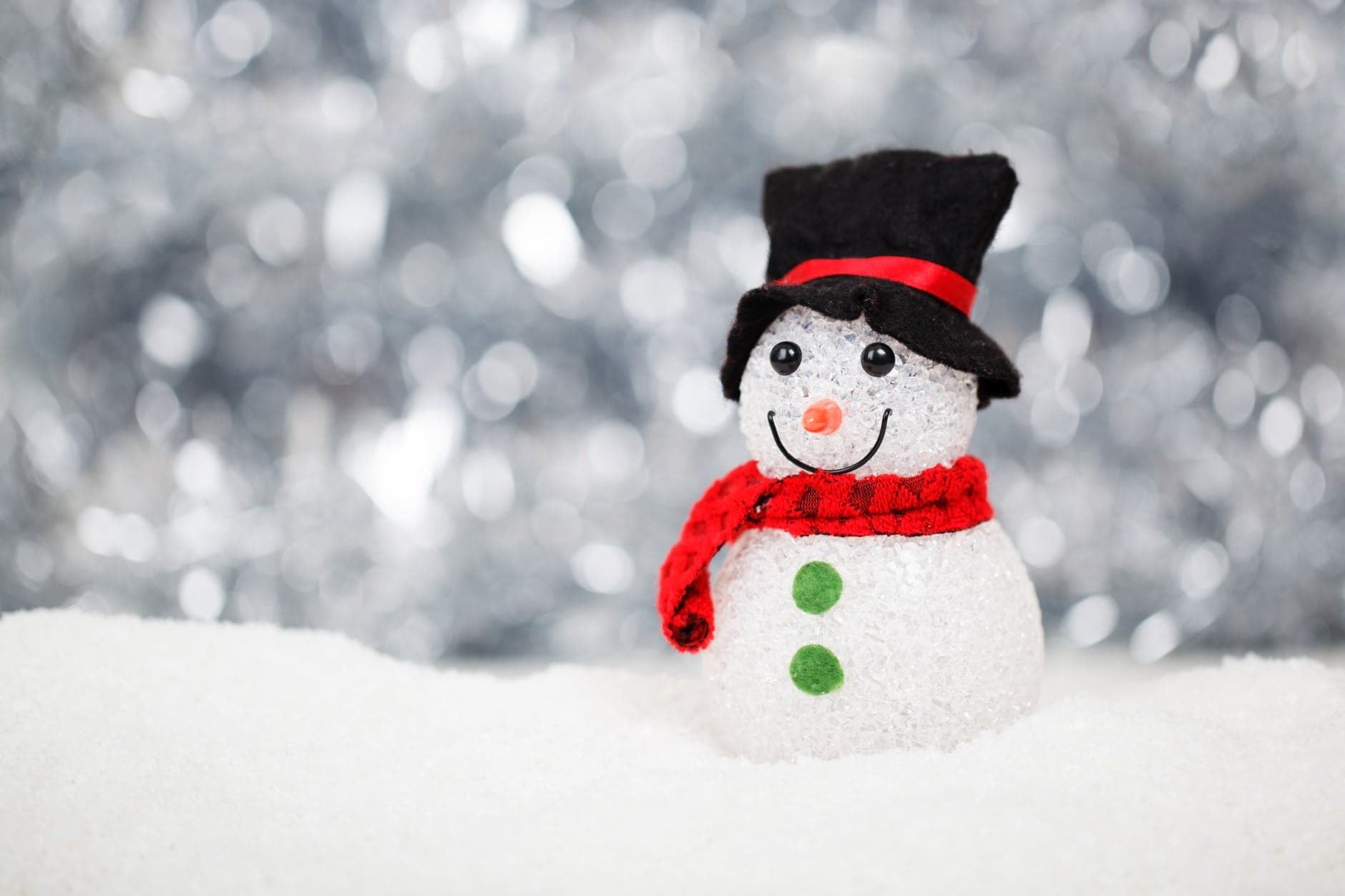Christmas, as we all know is the annual festival celebrated on the occasion of the birth of Jesus Christ in western culture. It falls on 25th December and is usually celebrated by decorating Christmas trees, lots of food and fanfare! However, not all the countries celebrate this festival as it is not in their culture. But, some have started to adapt Christmas in acknowledgment of the festival’s importance to other countries.
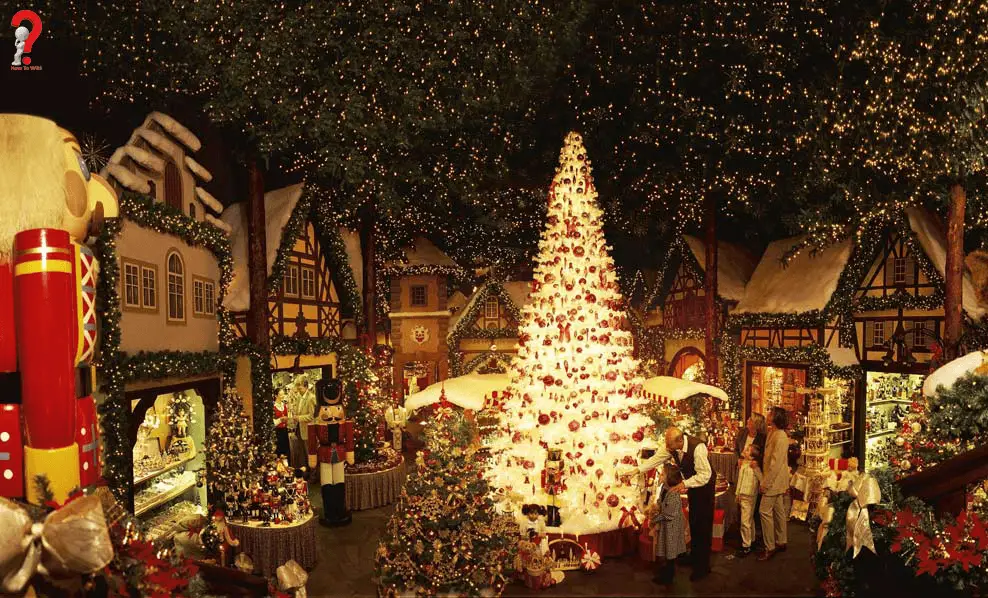
If you are from one of those cultures who does not celebrate Christmas but want to impress your German friend with culturally-appropriate Christmas phrases, here is how you can do so.
How To Say Merry Christmas In German?
In the German language, “Merry Christmas is pronounced as “Frohe Weihnachten”. It directly translates to the original phrase.
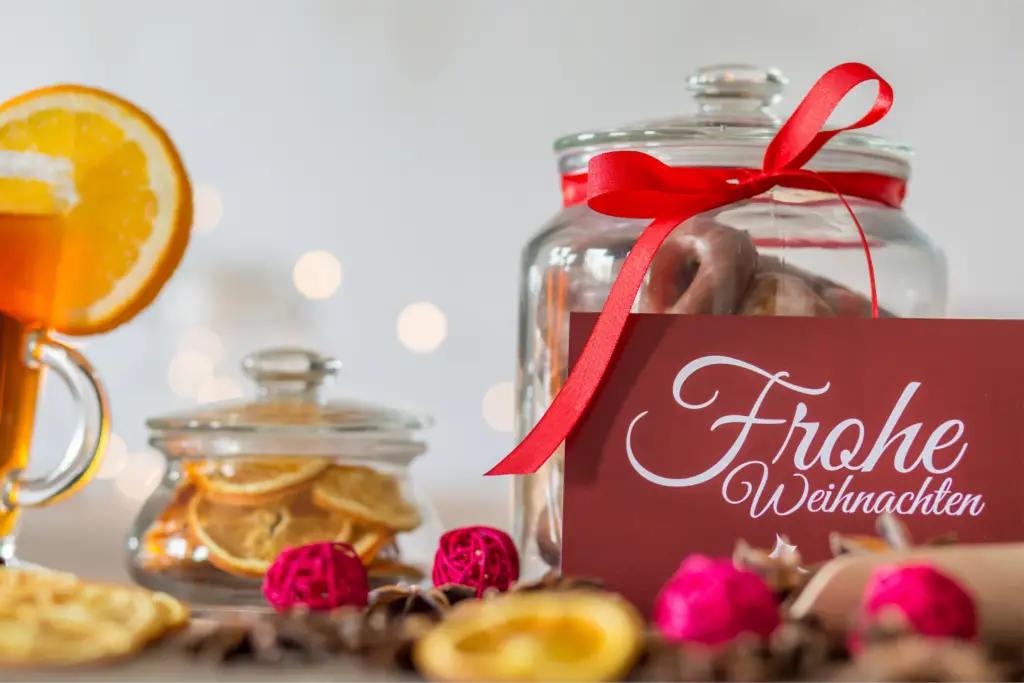
The Germans tend to follow their own rules when it comes to language, and the language has its own rules while we try to pronounce a word in the German language. Once you have memorized the rules, it will be more efficient for you to say something in German, even if it is a new word.
Here are tips on how to say “Frohe Weihnachten” to someone.
Merry Christmas In German Pronunciation
Pointer #1 Make sure you do not pronounce the “h” in the words. The h is silent, if not a very subtle breath
Pointer #2 You must take care of the “ch” in the second word, this is different then what you pronounce in English.
The pronunciation is better learned when you hear it, and for that, here is a video that you can watch ~
How to Wish “Merry Christmas too” in German?

Are you planning to spend this Christmas in Germany? Great. One phrase that you will hear all over at that time is “Frohe Weihnachten,” that is, Merry Christmas. As Christmas Eve comes close, you will hear it more frequently.
The German adjective term “froh” translates to “happy.” Thus, in the literal sense, the translation “Frohe Weihnachten” is “Happy Christmas.” However, the adjective term “from” modifies into “frohe” as the noun “Weihnachten” signifies a feminine gender in German.
Interestingly, Germans have extracted the phrase “Frohe Weihnachten” from the “Ich wunsche dir frohe Weihnachten” sentence, that is, “I wish you a Merry Christmas.”
So people are likely to say you “Frohe Weihnachten” on Christmas Eve. As an etiquette, you have to wish them “Merry Christmas to you too.” But how say it in German? Here’s the translation –“Merry Christmas to you too” translates to “Dir auch frohe Weihnachten” in German.
Other Christmas Wishes
You may hear some people wishing you “Frohliche Weihnachten.” It’s a little bit different version of “Frohe Weihnachten,” but both mean “Merry Christmas” or “Happy Christmas.” Both the translations are derived from the same source. However, the difference is that “froh” is an adjective meaning “glad” in English. On the other hand, “Frohlich” is also associated with “joyful.”
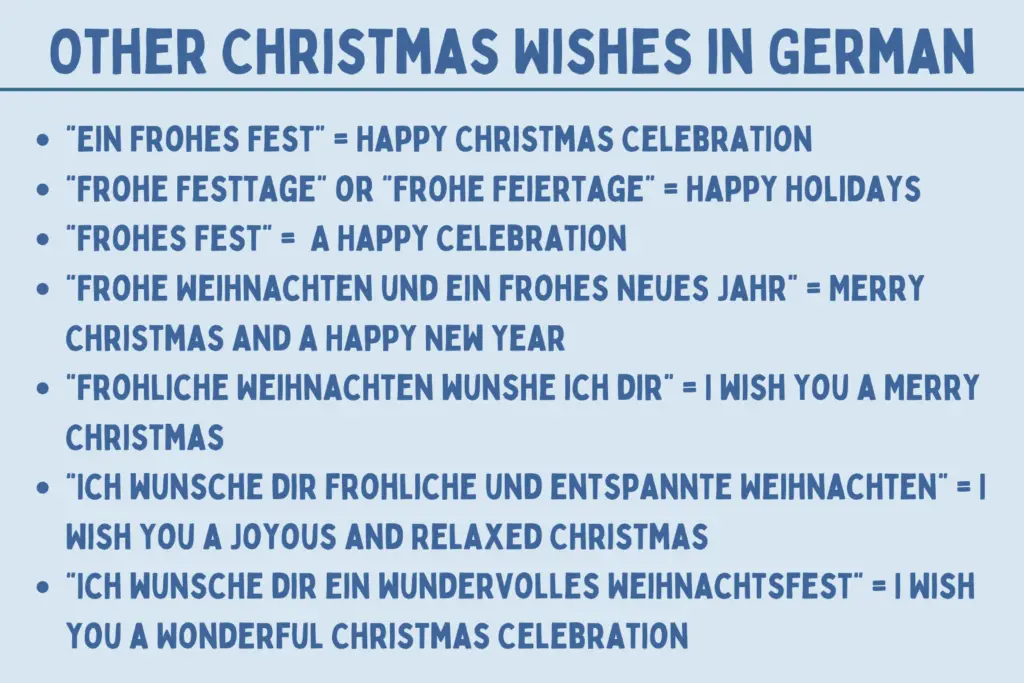
Well, Christmas and New Year’s Eve are the holiday seasons in Germany. Thus, you will find that people also greet you with many other wishes. They even frequently greet using longer phrases to make the Christmas wish feel warmer. You can come across several variations in wishes – just the adjectives are altered.
So here’s a list of other Christmas related wishes in German and their translation into English –
- “Ein Frohes Fest” = Happy Christmas Celebration
- “Frohe Festtage” or “Frohe Feiertage” = Happy Holidays
- “Frohes Fest” = A Happy Celebration
- “Frohe Weihnachten und ein frohes neues Jahr” = Merry Christmas and a Happy New Year
- “Frohliche Weihnachten wunshe ich dir” = I wish You a Merry Christmas
- “Ich wunsche dir frohliche und entspannte Weihnachten” = I Wish You a Joyous and Relaxed Christmas
- “Ich wunsche dir ein wundervolles Weihnachtsfest” = I Wish you a Wonderful Christmas Celebration
Important Dates for Christmas in Germany
You might be fascinated to know about some of Germany’s important dates and Christmas traditions. Let’s take a look!
St. Nicholas Day (Nikolaustag)
Germans start the Christmas celebration early. And children popularly celebrate St. Nicholas Day or “Nikolaustag” on December 6. The story says that the mysterious St. Nikolaus was a priest who distributed his wealth among children in particular and poor people. This historical figure wears red and has a long beard. However, don’t confuse St. Nikolaus with Father Christmas.
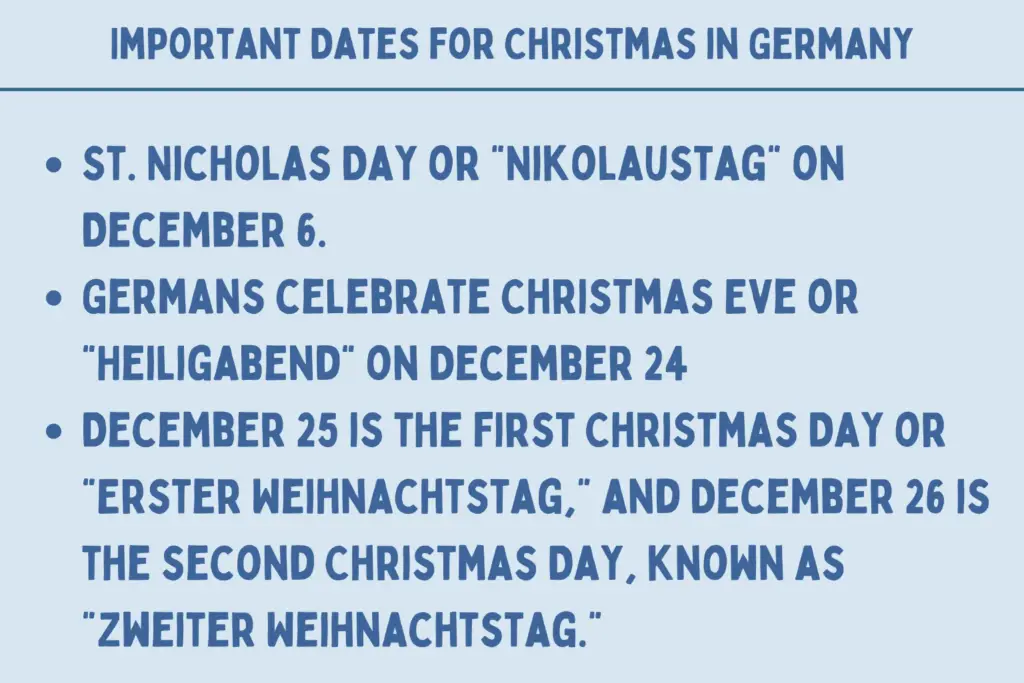
The celebration begins on the eve of the day before. First, children polish their boots or shoes before leaving them outside, hoping that they will be filled with sweets and goodies by St. Nikolaus.
Christmas Eve (Heiligabend)
Germans celebrate Heiligabend on December 24. People complete their work before lunchtime and then go to relatives’ houses to exchange and wrap presents. And some people decorate Christmas Tree (Tannenbaum) in their homes.
Christmas Day (Weihnachtstag)
One day isn’t enough for Christmas to celebrate! So Christmas is celebrated for two days in Germany. December 25 is the first Christmas Day or “Erster Weihnachtstag,” and December 26 is the second Christmas Day, known as “Zweiter Weihnachtstag.” During this period, people travel to visit distant family or relatives and celebrate their holidays by eating food and exchanging presents.
The Popular Christmas Traditions
Before scrolling down to explore some of the Christmas traditions in Germany, it will be fascinating to note that many of the world’s Christmas traditions that people cherish have originated in Germany.
Advent Calendar (Adventskalendar)
Countries that commemorate Christmas follow Advent calendars. However, the fascinating fact is that these calendars have emerged in Germany. These 100 years old calendars were invented to make the waiting tenure for Christmas more endurable for children.
It consists of 24 doors, generally made of cards. One door is for each day up to Christmas Eve. After that, people open each door on the appropriate day, which usually manifests as a scene of Christmas.
Christmas Markets (Weihnachtsmarkte)
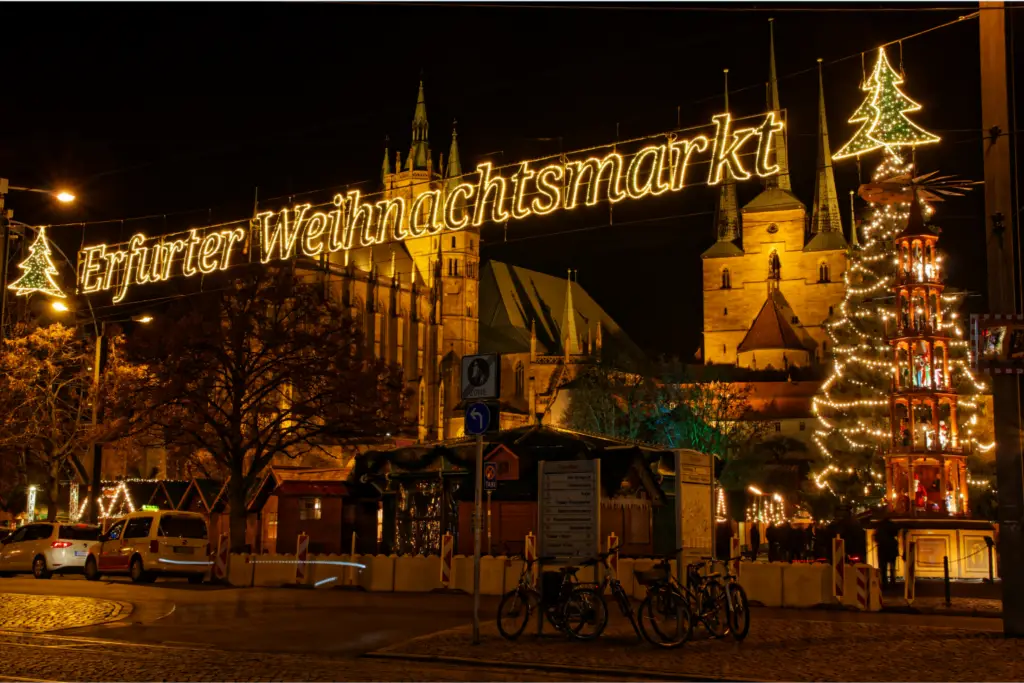
The Christmas Markets are among the main attractions during Christmas in Germany. If you are traveling to Germany at Christmas, make sure to peep into the market. It looks like a magical wonderland with snow everywhere, having several stalls with attractive gifts to buy.
You can even enjoy ice skating rinks, food, live music, and Gluhwein. Like Mulled Wine, Gluhwein is a traditional Christmas drink in Germany. It’s made from sugar, spices, and warm red wine that acts as a great winter warmer when strolling in the Christmas Markets.
Christmas Tree (Tannenbaum)
The Christmas Tree tradition is known to have originated in Germany. People traditionally decorate the Christmas Tree on December 24. Interestingly, it is known to be pretty different from the US and UK Christmas trees that turn up in December.
Christmas Stollen
It’s a traditional Christmas cake that Germany is known to sell nearly 2.5 million Stollen every year. However, this traditional German cake is made of flour, nuts, fruits, and spices. Even the city of Dresden hosts an annual Stollen festival that captivates endless customers.
Lebkuchen
Another sweet treat traditionally followed in Germany is Lebkuchen. It is prepared with flour, honey, eggs, sugar, marzipan, and different spices. Moreover, the city of Nuremberg (Nurnberg) exports this sweet treat worldwide, being the number one exporter.
Lebkuchen differ in size, ranging from cookie sizes to larger sizes like hearts. They are even decorated with chocolate or icing. You may even find this sweet treat topped with bright icing messages like the names of German carnivals or fairs.
Christmas Wreath (Adventskranz)
Christmas wreath or Adventskranz is a common German Christmas tradition. Germans usually built this Christmas wreath out of fir tree branches and other decorative things. Furthermore, they place four big candles on the wreath.
They lit the first candle (Kerze) on the 4th Sunday prior to Christmas and welcomed the Advent season. The next candle is lit each following Sunday. It symbolizes light in a dark season, representing pleasant anticipation of Jesus Christ’s birth.
